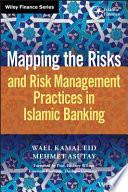
Mapping the Risks and Risk Management Practices in Islamic Banking
Deep, insightful analysis of controversial risk management issues in Islamic banking Mapping the Risks And Risk Management Practices In Islamic Banking is a comprehensive analysis of the current state of risk management practices within the Islamic banking industry, with recommendations for policy makers, bankers, and industry stakeholders. Going beyond the academic, this book presents the opinions and perceptions of industry financiers and bankers, alongside primary information and data collected by Islamic finance professionals to deconstruct and analyze the sector's current risk management practices. You'll get up to date on the latest attitudes and trends, and delve into the current issues surrounding risk management in Islamic banks. With a focus on practical applications, this authoritative guide discusses the unique risks facing Islamic banks, from the perspective of a wide range of practitioners. Risk management is one of the biggest, most controversial issues in Islamic finance, yet it remains under-researched. Many uncertainties exist for which the answers are still unclear, yet will play a large role in shaping the industry's future. This book digs deep into current ideas and practices to discover what's being done, what needs to be done, and what needs to stop happening to keep the future of Islamic finance strong. Explore both Islamic and traditional attitudes toward risk Examine current Islamic risk management practices Understand the latest industry issues and trends Consider the diverse range of risks unique to the Islamic banking sector Effective risk management in Islamic banking deserves priority attention. Unless the industry develops its own genuine risk management architecture, it cannot achieve its full potential and the viability needed for a more resilient financial system than the debunked Wall Street model. Mapping the Risks and Risk Management Practices in Islamic Banking provides a deep, authoritative analysis of where the industry is today and where it needs to develop.
- ISBN 13 : 111907780X
- ISBN 10 : 9781119077800
- Judul : Mapping the Risks and Risk Management Practices in Islamic Banking
- Pengarang : Wael Kamal Eid, Mehmet Asutay,
- Kategori : Business & Economics
- Penerbit : John Wiley & Sons
- Bahasa : en
- Tahun : 2019
- Halaman : 449
- Google Book : https://play.google.com/store/books/details?id=OqyfDwAAQBAJ&source=gbs_api
-
Ketersediaan :
Going beyond the academic, this book presents the opinions and perceptions of industry financiers and bankers, alongside primary information and data collected by Islamic finance professionals to deconstruct and analyze the sector's current ...





